8 best open source NAS operating systems for Linux
NAS (Network Attached Storage) helps troubleshoot data storage and concentration issues in one location. This is where people can access and share data 24/7 via the network. There are many companies that offer software + hardware NAS boxes, which are basically an outstanding NAS solution. For example, Qnap and Synology are two veteran NAS providers.
The cost of a NAS box depends on features like storage capacity, RAM, CPU, etc. But if you want to convert your old system into an NAS box without having to spend hundreds of dollars, there's a solution to this problem. Open source Linux NAS software are light Linux distros but powerful enough to handle your storage problem. You can build your own NAS server for small businesses, using old or new server / PC hardware. Below is a list of some of the best open source Linux NAS operating systems available on the Internet.
You can use the NAS box with some software like OwnCloud to create a home personal cloud storage solution. Personal cloud solution lets you sync your personal files directly from your desktop to your mobile device. You can also listen to your favorite songs and watch movies stored on your NAS or personal desktop while on the move with an Internet-connected mobile phone.
Top 8 free and open source NAS or SAN software
- FreeNAS
- XigmaNAS (formerly NAS4Free)
- OpenMediaVault (OMV)
- Rockstor: Private Cloud and open source NAS server
- Personal Cloud Server
- SMB Cloud Server
- Openfiler (Community version)
- Nexenta (Community version)
- Amahi
- Other open source NAS / SAN projects
- ESOS - Enterprise Storage OS
- OpenATTIC: Open source management and Ceph
- Opendup
- PetaSAN
- CryptoNAS
FreeNAS

FreeNAS is the most popular free and open source NAS operating system, with enterprise-level features and ZFS open source file system. FreeNAS can be installed on real or virtual hardware to create a centralized data environment. The interface that FreeNAS provides is very intuitive (web interface). FreeNAS supports many data sharing protocols of Windows SMB / CIFS, NFS, Apple Filing Protocol (AFP), FTP, iSCSI. In addition, FreeNAS also supports plugins like CouchPotato, SickBeard, SABnzbd, Maraschino, HTPC Manager, etc. to expand functionality.
One thing to note before installing this operating system on some systems with the old specs is that FreeNAS needs a fair amount of RAM to operate, especially when you intend to install the ZFS file system.
Link to reference: https://www.freenas.org/
XigmaNAS (formerly NAS4Free)
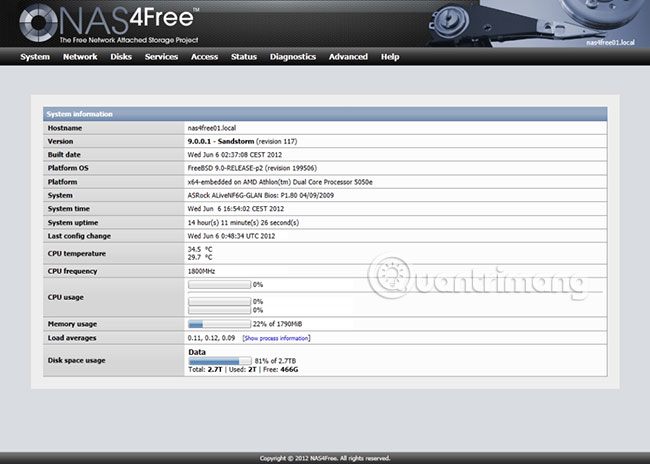
NAS4Free is a freeBSD-based open source NAS distribution. Previously it was called NAS4Free but in 2018, the developer changed the name of the operating system to XigmaNAS. XigmaNAS supports data sharing on Windows, Apple and UNIX systems. XigmaNAS includes ZFS v5000, Software RAID (0,1,5), disk encryption, SMART reports / emails, etc. with the following protocols: CIFS / SMB (Samba), Active Directory Domain Controller (Samba) , FTP, NFS, TFTP, AFP, RSYNC, Unison, iSCSI, HAST, CARP, Bridge, UPnP and BitTorrent, are highly configurable thanks to the web interface.
XigmaNAS supports ZFS and encryption services. The web interface is not very user friendly and you may encounter some difficulties while navigating and expanding its functionality through the plugin.
Link to reference: https://freenas.org/freenas-vs-nas4free/
OpenMediaVault (OMV)
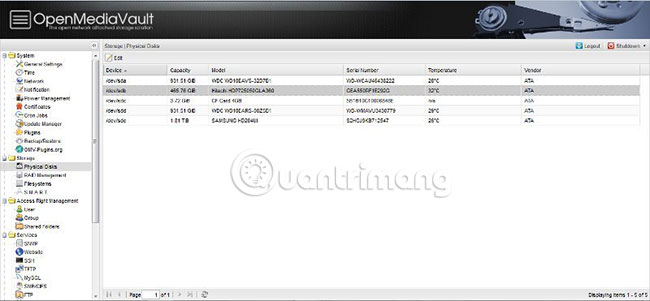
OpenMediaVault is a very reliable NAS solution based on Debian Linux. OpenMediaVault may be the option you are looking for, if you do not want to use ZFS. The services it provides are SSH, (S) FTP, SMB / CIFS, Rsync, BitTorrent client, DAAP media server, etc. OpenMediaVault based on Debian means you will receive regular patches and updates. . The plugins for OpenMediaVault are not many, but still develop at a good speed and will still make home users happy. Web interface owned by OpenMediaVault is very neat and user-friendly.
Link reference: https://www.openmediavault.org/
Rockstor: Private Cloud and open source NAS server
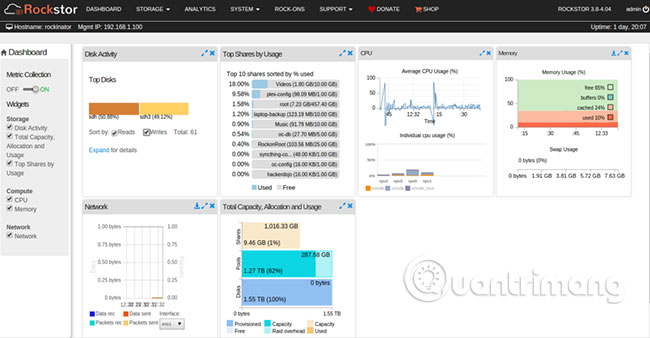
Rocktsor is based on Centos Linux and BTRFS to provide NAS and cloud storage features. Rocktsor is built on CentOS and this is a remarkable plus. Rocktsor supports BTRFS, a file system like ZFS to provide security features and ensure high data integrity. Rocktsor can be used as a personal cloud server (personal cloud server) and SMB Cloud Server with simple and neat web GUI
Personal Cloud Server
Rockstor Personal Cloud Server allows you to create private cloud locally to reduce risks and costs when using Public Cloud.
Main features of Personal Cloud Server:
- Cut the cost
- Effective privacy and performance management
- Access data from desktop, laptop or mobile device anywhere.
- Ability to move data between public cloud, Rockstor and your device.
SMB Cloud Server
Rockstor Small and MidSize Business (SMB) Cloud Server is a special build for small businesses that require a few hundred Terabytes of capacity to meet business needs. You can save important business data on Rockstor SMB cloud server and less sensitive data on public cloud. The effect of this is to reduce the cost and increase the security of the data. In addition, an organization does not need to rely entirely on an expensive public cloud service.
Features of SMB Cloud Server:
- Build Private Cloud Storage (private cloud storage) with on-premises workflow synchronization capabilities and the cloud.
- Seamless integration with public cloud storage
- Expand storage capacity on demand
Link to reference: http://rockstor.com/
Openfiler (Community version)
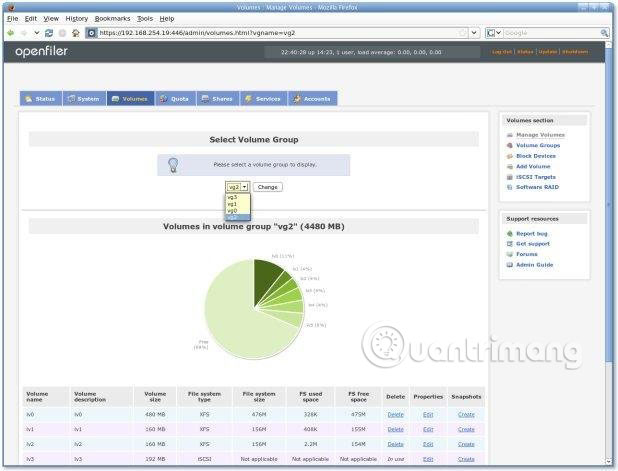
Openfiler is another enterprise-class NAS / SAN distro like FreeNAS. Can convert old system easily into an IP-based storage. Openfiler provides some very useful features like iSCSI Target to virtualize, support Fiber Channel Target and copy block level. You may face some update issues when using Openfiler. In addition, the operating system based on Openfiler is a distribution of rPath Linux, which has not been updated since 2008. This makes Openfiler not a reliable choice, but you can learn or spend some money. distribution of new NAS software.
Link to reference: https://www.openfiler.com/
Nexenta (Community version)

This version of Nexenta is a free option, basically a community version of a commercial storage product. This free version can support up to 18TB of storage. It provides ZFS and Solaris-based open support called Illumos. Since this is a strip version of a commercial product, you don't have to worry about updates, stability and support when you need it.
It can be very useful for small business and household users with limited features. If you are looking for an option for big business then you should consider Nexenta commercial version.
Link to: https://community.nexenta.com/s/community-edition
Amahi
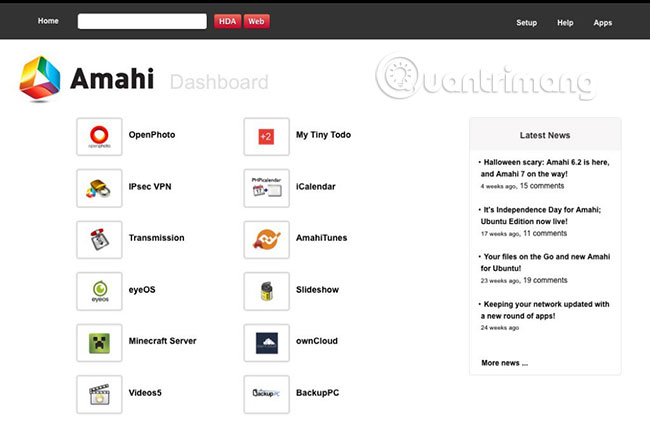
Amahi cannot be considered a NAS operating system, as it is commonly known as a home server. Amahi is a community version built on the commercial version.
Amahi is a home server with numerous applications and plugins to expand functions like WordPress, Plex media server, OpenVPN, OwnCloud, etc. Amahi handles your entertainment, storage and calculation needs.
You can store, organize and distribute recorded TV, video and music programs for media devices in the network. Amahi is based on most popular Fedora & Ubuntu distributions. Because Amahi is not an official NAS, so don't use it to store important data or secrets. Also, you can't rely entirely on Amahi's cloud system, because you don't know how secure it is.
Link to reference: https://www.amahi.org/
Other open source NAS / SAN projects
ESOS - Enterprise Storage OS
Enterprise Storage OS is an almost Linux distribution based on the SCST project. Its purpose is to provide SCSI Target via compatible SAN (Fiber Channel, InfiniBand, iSCSI, FCoE).
Link to reference: http://www.esos-project.com/
OpenATTIC: Open source management and Ceph
OpenATTIC is an open source Ceph and storage management solution for Linux. OpenATTIC focuses on managing storage in a data center environment. The project is funded by SUSE.
Link to reference: https://www.openattic.org/
Opendup
A file system and cloud storage port.
Link reference: https://opendedup.org/odd/
PetaSAN
PetaSAN is a SAN scaling solution. PetaSAN is designed from scratch to do one thing: Provide high availability clustered iSCSI drives.
Link reference: http://www.petasan.org/
CryptoNAS

CryptoNAS is a web-based NAS server operating system, formerly known as CryptoBox. This NAS project specifically focuses on drive encryption. It comes with the CryptoNAS live-CD and CryptoNAS-Server package.
- CryptoNAS live-CD : Direct CD can be used to encrypt data without bothering with complex technical issues. A CD-based computer directly acts as a file server that encrypts your private data.
- CryptoNAS-Server Package : Add user-friendly web-based front-end to encrypt hard drive to existing file server.
Link to reference: https://cryptonas.senselab.org/